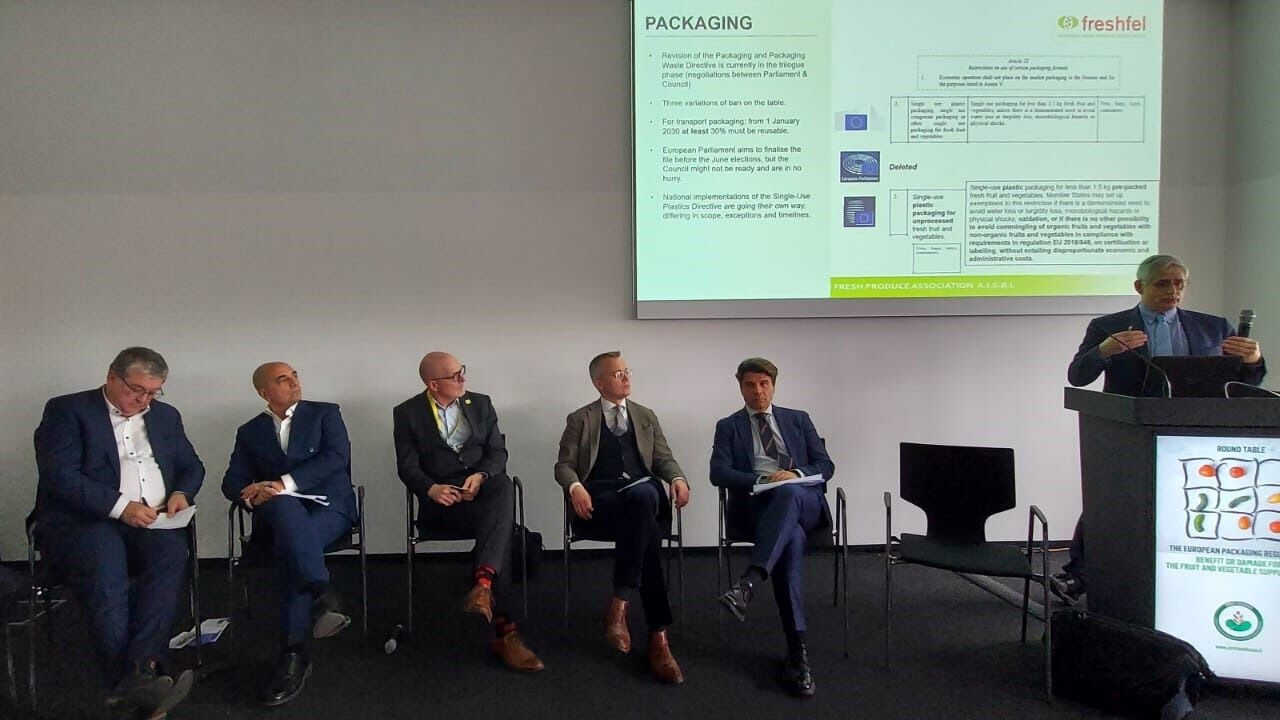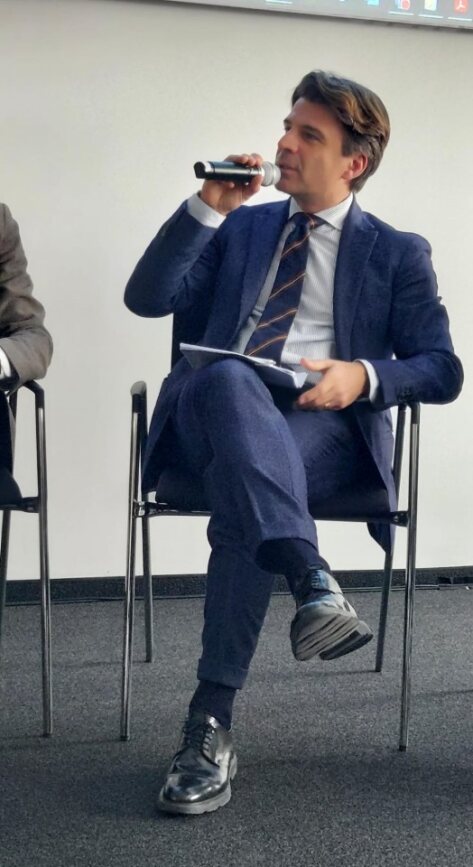Packaging
Negative impacts on food waste and CO2 emissions expected from the packaging regulation
Representatives of leading European fruit and vegetable supply chain organizations, gathered by Pro Food in a roundtable discussion on PPWR at the Fruit Logistica trade fair in Berlin, agreed to reiterate the need for a non-ideological, data-driven approach

The proposed Packaging and Packaging Waste Regulation (PPWR) has reached its final stages with the confrontation between the two positions expressed in late 2023 by the European Parliament and the EU Council.
While discussions are taking place in Brussels to find a compromise between the different proposals, Pro Food, the association representing the main European producers of fresh food packaging, organized at Fruit Logistica, the most important European event in the fruit and vegetable sector, the round table The european packaging Regulation: benefit or damage for the fruit and vegetable supply chain? during which some of the strategic representatives of the sector brought their experiences and evaluations on PPWR.
Very critical on the proposal of eliminating packaging for fruit and vegetable is Massimiliano del Core, president of Ortofrutta Italia, who stressed the importance of plastic packaging in defending the value of products and prolonging shelf life, a relevant aspect especially for the export of fruit and vegetables. "Furthermore," he added, "packaging is a tool to combat food waste, which occurs 70 percent after purchase by end consumers. No less important, finally, is the role that packaging plays in enhancing the value of fruit and vegetables in the markets through the communication of product characteristics and origin. The regulation should focus on end-of-life management to incentivize recycling."

Massimiliano del Core, president of Ortofrutta Italia
Luigi Scordamaglia, CEO of Filiera Italia and president of Eat Europe, is also on the same lines, noting how this proposed regulation would lead to the destruction of 32,000 jobs in Italy alone. "On the one hand, the EU invests funds in promoting the consumption of healthy foods of which fruit and vegetables are central, and on the other hand, by eliminating packaging, it prevents the very promotion of these products while also increasing food waste."
Luigi Scordamaglia, CEO of Filiera Italia and president of Eat Europe
Also opposed to the ideological attitude of the European Commission is Luc Vanoirbeek, chairman of the F&V working group of COPA-COGECA, who specifies that laws must be fair, realistic and affordable. PPWR does not meet any of these requirements. He also hopes to open a more reasonable dialogue with the next Commission.
Luc Vanoirbeek, chairman of the F&V working group of COPA-COGECA
Martin Engelmann, general manager of IK Industrievereinigung Kunststoffverpackungen, which represents the plastics processing industries in Germany, points out that from the point of view of the legal approach, the ban on the use of only plastic packaging probably violates the principle of equal treatment enshrined in EU law, unless there is an objective justification for differential treatment. "In this regard," he says, "the EU legislator has a margin of discretion, but with certain limits. In particular, it must take into account all available scientific facts and data. Data and factors that in the case of PPWR have not been properly analyzed through a serious and thorough impact assessment."
Martin Engelmann, general manager of IK Industrievereinigung Kunststoffverpackungen
Philippe Binard, Freshfel Europe's delegate general (speacher in the picture), points out that pointing the finger at the fruit and vegetable sector is disproportionate to its impact on the volumes of packaging placed on the market: "In fact, packaging for fresh produce accounts for only 1.5 percent of all food packaging currently used in the EU. Moreover, about 50 percent of fruits and vegetables are already sold in bulk, showing that the market has already optimized as much as it could be. The proposal to avoid single-use plastic packaging for fresh fruits and vegetables denotes policy inconsistency, generating increased food waste and limiting the use of post-harvest treatments for better preservation of produce, which require to be done within specific packaging."
The risks to the sustainability of the fruit and vegetable supply chain brought about by ill-considered regulatory proposals are not unique to the European Union. Daniel Duguay, sustainability specialist at CPMA (Canadian Produce Marketing Association), brought testimony of this, explaining how in Canada they are experiencing a situation very similar to that in Europe because of the federal Ministry of Environment's proposal. This calls for the sale of fruits and vegetables in bulk or in plastic-free packaging (75 percent by 2026 and 95 percent by 2028), and CPMA has done several studies showing that this would have a negative impact on the sustainability of Canada's fresh produce supply chain.
"Rather," comments Duguay, "more space should be given to closing structural gaps for the realization of a true circular economy. Attention should be given to educating consumers about the role that primary packaging plays in food: the value of packaging is largely unperceived when you consider that 90 percent of its function is performed before the consumer sees it on the store shelf."
"Packaging is an essential factor in the fruit and vegetable supply chain with very important functionalities even if not always obvious to the consumer. The elimination or replacement of plastic packaging must be evaluated with scientific data not only of the packaging itself but also of the impact on logistics and content," concludes Mauro Salini PRO FOOD President. "Then, when we talk about the sustainability of packaging, the approach should be holistic and consider not only the environmental aspect but also the economic and social.”
These points underscore the complexity of the issue of packaging for fruits and vegetables. It is important to find sustainable solutions that consider all these aspects and involve the entire supply chain to achieve a balance between functionality, sustainability and circularity. "In this regard," Salini continues, "in light of the positions expressed during the round table, a common stance by all supply chain actors would be appropriate to prevent PPWR from generating further damage to a vital sector."
Source
Press Office Profood c/o fruitecom











